By Joel Meyers, Director of Communications, GlobalWA
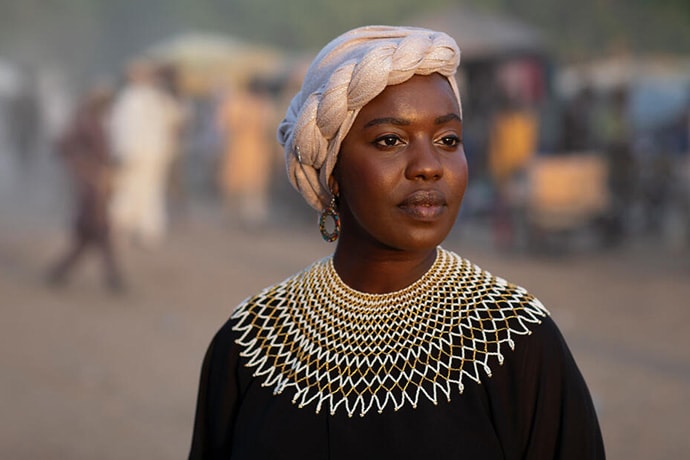
Emtithal (Emi) Mahmoud, Sudanese-American poet and activist, who won the 2015 Individual World Poetry Slam championship and in 2018 became a UNHCR Goodwill Ambassador, visiting the Far North Region of Cameroon. The region hosts about 121,000 refugees, mostly Nigerians fleeing Boko Haram, and over 427,000 internally displaced people, some displaced by extreme weather events and conflicts linked to climate change. © UNHCR/Caroline Irby
“So many people who are in some of the worst situations humanly imaginable are the most optimistic and hopeful and resourceful people out there. If we put vulnerable people at the forefront of change and give them even a fraction of the resources that we have, that we throw away in leftover food, or instead of buying a new upgrade on our phone, for example, if we just put aside a little bit of that, it will make a huge difference.
“I see the kids who are in the refugee camps all over the world, and I don’t see hatred in them. I don’t see them saying things or have feeling things like, ‘the first thing I’m gonna do when I get out of here is get revenge on the person who kicked me out of my home.’ That’s not what refugees say. That’s not what I’m seeing. What I’m seeing is: ‘if I had a moment, if I had a chance, I would go back, I’d rebuild it better. I would make sure nothing like this could happen again. I would help anyone who’s displaced, anyone who’s a refugee.’
“That’s the hope for me. Knowing that the people who are the most affected, they themselves want us to move forward into peace, into prosperity, into change.”
– Emtithal “Emi” Mahmoud
Emi Mahmoud is a Sudanese American and former refugee who is a celebrated poet, activist, founder, and UNHCR Goodwill Ambassador who now lives in Philadelphia. Her refugee experience is singular, though not atypical.
Emi was born in Khartoum, the capital of Sudan, and her family is from Darfur. Her mother is a medical lab technologist and her father is a surgeon. When she was one year old, she and her family escaped to Yemen. Sudan was in the midst of its second civil war.
After several years in Yemen, when Emi was 4, she and her family were able to enter the US having been awarded visas through the US Diversity Visa lottery. They settled first in Virginia where a few other family members resided, then moved to Indiana, then Philadelphia where she has lived since.
Emi attended preschool in the US, then kindergarten, and in 2000, before starting first grade, she, her younger sibling, and her mom went back to Sudan to visit family when she experienced a harrowing life-changing event:
“I remember hiding under the bed with my sibling and cousins. I remember, I just remember so much. I wrote about it in this poem called People Like Us. I remember the blood on the soldiers—the blood on their ankles. But I just remember that there was blood. We were hiding, and these young girls came knocking on our door. We thought it was the soldiers, but it was these two girls, and they said, we have to hide now. Because after the people protested, the army chased them into the town, and we were kids home alone, and we didn’t really know what was going on. So much of what I saw and what I learned, what we experienced, is a lot of what essentially changed childhood for me, and what it was like, or what it meant.”
After 6 months, they were able to make it back to the US safely and she started first grade.
“And I just remember everything being different from then. You just have to pretend like nothing happened. It was very, very hard…” she reflected. “I remember my first-grade assistant teacher asking all of us like, ‘Oh, so what did you do over the summer?’ And so, I just completely made up a story. I said I went to Sudan, and then the rest of it was just all a lie. I said that we had a pet monkey and my sister liked to eat bananas, but the monkey kept taking the bananas, you know, and the teacher was like, Wow! And he just moved on.”
Now as a UNHCR Goodwill Ambassador, and through her award-winning writing and powerful performances on global stages, including the UN General Assembly, COP, the World Economic Forum in Davos, and the Women’s Forum in Paris, Emi has raised awareness of the global refugee crisis, creating empathy, and advocating on behalf of the forcibly displaced.
*****
UNHCR, the UN Refugee Agency: A Rich History of Helping Refugees
During the Second Sudanese Civil War, roughly two million people died from fighting, catastrophic hunger crisis and disease caused by the conflict between the northern part of Sudan and the south, and eventually led to a referendum resulting in South Sudan gaining independence from Sudan in 2011. Four million people in southern Sudan were displaced at least once, normally repeatedly during that war. The civilian death toll from that time is one of the highest of any war since World War II and was marked by numerous human rights violations, including slavery and mass killings.
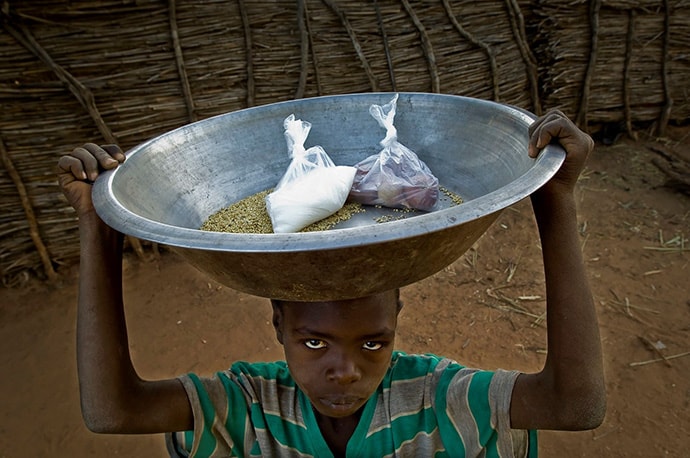
Chad / Darfurian refugees from Sudan / Djabal camp (17,766 refugees, 4,681 families), 4 kilometers west from Goz Beida UNHCR sub-office located 217 km south from Abeche, located 900 kilometer east from N’Djamena the Chadian capital. The camp, created on 4/6/2004, is located 80 km from the Sudanese border. Ahmed Mahamat Khamis, 8 years old, on his way back home from the grocery where he bartered millet for sugar and onions. He carries in a bucket on his head a bag of sugar, some onions (in plastic pocket) and the “change”: some millet. The barter economy is common practice in the camps. A refugee brings a product to the grocery to get what he lacks (sugar, onion, soap,…). A koro of mill (measure of a big iron bowl) is equivalent to 400 CFA (0.85 USD). Photo: UNHCR / F. Noy / December 2011/ CC by 2.0
As of September 2023, globally those displaced by war, violence, persecution, and human rights abuses stood at 114 million, well over double the figure of 10 years ago. The number of people forced to flee their homes has increased every year over the past decade and stands at the highest level since records began, a trend that can only be reversed by a new, concerted push towards peacemaking.
“The situation of civilians in Sudan and in Ukraine, including millions who are refugees and displaced, demands our attention and support,” said Junia Geisler, Senior Director of Communications at USA for UNHCR, “as do protracted crises like the plight of the Rohingya, the Syria situation, Afghanistan, the ongoing struggles in the Democratic Republic of the Congo, the growing insecurity in the Sahel, the dramatic population flows across the Americas, the Mediterranean and the Bay of Bengal, and many others.”
UNHCR knows. They have been on the front lines of providing vital protection and assistance to refugees, asylum-seekers, internally displaced, and stateless people since 1950. Formally known as the Office of the High Commissioner for Refugees, UNHCR was established by the General Assembly of the United Nations in 1950 in the aftermath of the Second World War to help the millions of people who had lost their homes. Today, UNHCR works in 135 countries and provides life-saving assistance, including shelter, food, water, and medical care for people forced to flee conflict and persecution, many of whom have nobody left to turn to.
In addition to emergency response, UNHCR works with many local partners around the world on local integration programs which benefit both host communities and refugees. A great example of this is the Local Integration Program in Mexico led by UNHCR and supported by USA for UNHCR that gives refugees and asylum seekers in Mexico the resources and opportunities they need to start rebuilding. The goal of this program is to provide an option for refugees who are interested in integrating into communities in Mexico. The initiative supports refugees from their arrival all the way through to naturalization.
“Depending on the circumstances of those participating in the program, UNHCR either offers relocation within Mexico, or they offer integration support to refugees wherever they reside,” says Junia. Since the beginning of the program in 2019, more than 30,000 refugees and asylum seekers have participated in the relocation option and more than 80,000 have received integration support in their city of residence. Currently, the program is active in 21 cities across the country.
A Refugee Processing the Unthinkable
Emi’s parents did what they could to shield her and her sibling, Fofo, from the atrocities happening around them. “Every day, every morning they’d play a little piano keyboard and sing to us, and then they’d go to work, and you know we were refugees hiding in Yemen, and we didn’t know what was going on because we were kids, but my parents tried to make it as innocent of a childhood as possible.”
“It was a time after that before I started really processing what happened,” she remembers. “[When I was young] I liked science, and I wanted to be a paleontologist, and then I changed my mind to neurosurgeon, and I wrote poetry. I wrote poetry when I was 7, and then it changed when I was 10, when I found out about the conflict. And then my poetry changed from being about innocent things like lions… then it started to be about the war in Darfur.”
Emi gained a lot of recognition and prominence with her spoken-word poetry – a more powerful and accessible modality because you hear the words spoken how they are intended to be heard (and it connects back to oral traditions in Sudan and many other cultures). Hearing and seeing the poet recite a piece, “you essentially transport them to the moment you’re talking about,” she explained.
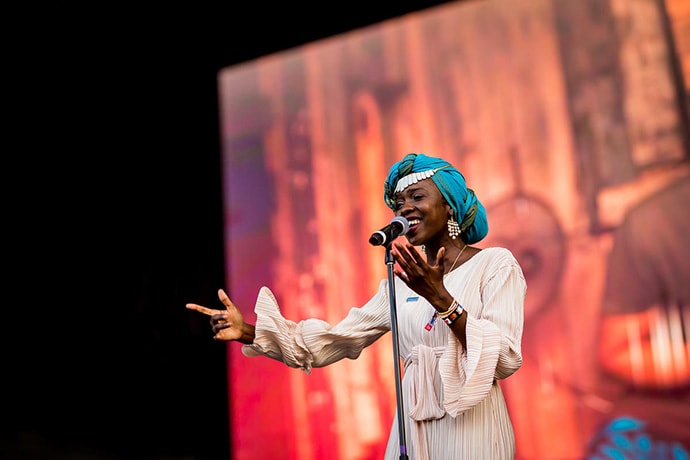
Slam Poet and UNHCR Goodwill Ambassador Emi Mahmoud performs at the Sziget Festival in Hungary, August 12, 2019. © László Mudra/Rockstar Photographers
“In college I was doing slam poetry (spoken word poetry in competitions) and by senior year I had entered the individual World Poetry championship, and I won, and I became the youngest one ever to do that. So that was the first world record that I broke, spoken slam poetry. And then I won the Women of the World championship right after that. And so, I broke another world record because I was the youngest one to do that.” And, she is the youngest and only person to have held both records simultaneously as well.
In between, Emi became one of BBC’s 100 most inspirational women and gained even more recognition for the work she was doing.
Then one day in her senior year, she received an email that altered her life in profound ways.
A Life-changing Invitation
Emi received the email from UNHCR, inviting her to join them in Geneva for the Nansen Refugee Award. (Established in 1954, the UNHCR Nansen Refugee Award “honours individuals, groups and organizations who go above and beyond the call of duty to protect refugees, as well as internally displaced and stateless people.”)
UNHCR invited her to visit areas where they work. She went to Lesvos, Greece, “and again everything changed. It was just very, very harrowing to see how much had been done to everyone, and how it was all gone in that moment. I saw all of the life jackets and so much more. And I saw the work that our Nansen Honoree was doing that year.”
(The 2016 award recognized Greek volunteers Efi Latsoudi and the Hellenic Rescue Team and the work of all volunteers in Greece and Europe in 2015, when Europe faced its biggest refugee crisis in decades, as over one million people arrived during the year. Over 850,000 people reached Greece by sea, with more than 500,000 of these arriving on the island of Lesvos alone.)
“It was the first engagement [with UNHCR], and I wrote something about what I saw there, and I performed it at Nansen.”
She wanted to do more, “because in that moment I felt like I was standing on the other side of so many struggles just like mine,” she said. “I remembered that when I was a kid my parents were the ones speaking about it, and nobody believed us at first, but the first people to believe us were survivors of other conflicts… It was that we were related, all of us, we were in the same boat. And I remember it was this moment of unity and moment of understanding.”
She sensed a recognition with other refugees, between people who have gone through similar struggles, whether it’s different time periods, different peoples, or different contexts. And it helped her gain a deeper understanding of her childhood experiences.
This wasn’t her only eye-opening moment. Earlier, in 2013, in her freshman year of college, Emi gained deeper awareness when she went to Al-Fashir, the capital of Darfur, and worked in a birthing hospital in a refugee camp.
“I understood then that it’s not enough to be a good doctor. The limiting factor isn’t how well you do what you do, or how much knowledge you have to take away pain and such. If you don’t have medicine, if you don’t have supplies, if you’re working in a literally half-built hospital. If you are dealing with centuries of inequality that’s coming to fruition. There you get stuck. And so, I understood right then and there that I would need to have more reach and more knowledge and more collaborators to be able to make any kind of difference in any space, at all.”
As a UNHCR Global Goodwill Ambassador, and one of the first who was a refugee, Emi now has more ability to affect change – or more succinctly, how she can channel her energy to affect change she wants to see.
The True Value of Peace
Now that she is “at the table,” she understands international law better, and how different governments interact with each other, how different INGO’s operate. She also realized that she had an opportunity to evolve her role from not just building awareness and inspiring empathy – which is the main formula of the Goodwill Ambassador role – but to go beyond in a way that will really change the status of refugees and displaced people around the world.
“It’s not just about empathy or compassion. It’s about shifting perspective and shifting the paradigm.”
Now, when she meets with heads of state she talks about the benefits of helping refugees resettle, with a new message: “here’s why helping refugees and helping displaced people – here’s why setting a precedent for our world in general – can actually change the world for the better and affect all of us in the long run. When I go in there, I say it’s not just the right thing to do, but it’s a smart thing to do economically. It’s a smart thing to do geopolitically. It’s a smart thing to do from a humanitarian perspective. And it’s a smart thing to do for our future.”
Just as war is a de-stabilizing force, causing economic hardship and exodus, peace is a stabilizing force resulting in economic stability, growth, and prosperity. There is true value in peace.
“Peace is not just a word, peace is a tool that we could use to rebuild our world,” she told me.
And many times it takes deeper discussions to help others truly understand what it is like for those whose lives are disrupted and threatened, to understand why it is important to help. The civilian populations forced to flee simply want peace, to move back to their homes, and to get back to their lives. In Sudan, “if given the opportunity, if given the safety, they’d go back home and rebuild it like we were already doing or starting to do after 2019,” observed Emi.
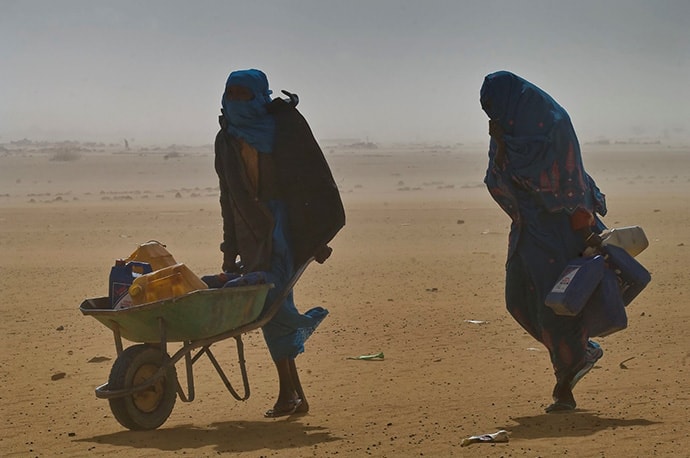
Chad / Darfurian refugees from Sudan / Oure Cassoni camp (Head of Office in Bahai said 31,800 refugees, december 2011), 18 kilometers north from Bahai UNHCR sub-office located 361 km north-east from Abeche, located 900 kilometer east from N’Djamena the chadian capital. The camp is located 17 km from the Sudanese border, and was opened in July 2004. A couple of female refugees go with difficulty because of the sandy, cold and strong wind to the well in Oure Cassoni to fetch water. Photo: UNHCR / F. Noy / December 2011 / CC by 2.0
Most wars start without the consent of the affected populations. Refugees don’t choose to be displaced. Climate refugees don’t choose to leave their homes due to flood or drought. No one chooses to become a refugee. Refugees are people who are forced to leave their home country due to persecution, conflict, violence or other circumstances that threaten their safety and life. The risks to their safety and life were so great that they felt they had no choice but to leave and seek safety outside their country because their own government cannot or will not protect them from those dangers. And refugees have a right to international protection.
Dispelling Misconceptions, Shifting Perspectives
There are still a lot of misconceptions about who refugees and displaced people really are, Emi said, and this is one of the most pressing problems she sees about the plight of refugees and displaced persons.
“There’s the clear stuff that people see on the news, that there’s a crisis, that emergency aid is needed. But imagine being a refugee, and you don’t have soap and you can’t shower, or you can’t wash the few clothes you have. Or you have a baby and you have no diapers and you have to change your baby’s diaper, or in some cases through distributed aid you can get only one diaper a day.”
Especially problematic is if you lose your papers, your passport – one of the main elements that define your place in this world today – that you belong.
These situations are not captured by the media or shown to the world. But these are very real situations that refugees and displaced people must deal with every day.
“And so, all of a sudden, not only your autonomy goes out the window, but your dignity. And the humanity that is between us… I think one of the most powerful and most important things that I hope to help people understand is that refugees and displaced people are part of the world.”
And we live in this world, we are part of this world, she continues, “and what’s so painful about that is that people start to just expect refugees and displaced people to be the responsibility of organizations that are mandated to deal with or support refugees and displaced people.”
“I think that refugees and displaced people – that vulnerable people in general – are the responsibility of all of the world because it is a measure of our world. And it’s something that is part of our world, and us allowing it to go without help, without support, allowing people to be forced from home, or killed, or to die from lack of access to food or safety, and allowing it to happen, is essentially condoning it.”
“We’re essentially setting a precedent and saying that we are comfortable living in a world where, if tomorrow, Americans were forced out of their home and had nowhere to go, it would be totally fine if the rest of the world turned our backs, turned their backs.”
We Are in This Together
“There’s stuff that we can move forward together that none of us can move alone, and that’s what keeps me in it. I don’t think anyone who really knew what was happening, wouldn’t try and do something,” Emi said.
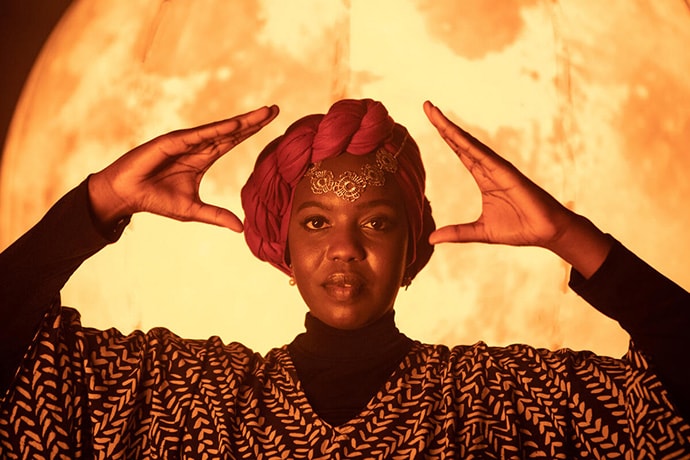
UNHCR Goodwill Ambassador Emi Mahmoud wrote a poem about climate change and its impact on displaced people ahead of COP26, the UN Climate Change Conference, where she performed. © NHCR/Andy Hall, November 02, 2021
She was reminded of a quote by a former UN High Commissioner for Refugees, Sadako Ogata: “There are no humanitarian solutions to humanitarian problems.”
“A lot of people believe that means that there’s no solutions to humanitarian problems,” Emi explains, “but that’s not what it means at all! It means that there are no humanitarian solutions because these problems aren’t created by our humanity. And I think a lot of people miss that point when they hear that. ‘Humanitarian problems’ is a misnomer because they’re not created by humanity, they’re not created by humanitarianism. They’re created by imbalances. There are political solutions, there are economic solutions, there are state solutions that could help fix it.”
That’s perspective shifting right there.
Read more about Emi and her amazing work on her website and on the UNHCR website.
*****
We asked Junia Geisler, Senior Director of Communications at USA for UNHCR, what’s the best way for an average American to get involved in helping refugees? Here are her answers:
- Donate. USA for UNHCR helps to protect refugees and people displaced by violence, conflict, and persecution. We support UNHCR, the UN Refugee Agency, in providing lifesaving essentials for refugees including shelter, water, food, safety and protection. During an emergency, your donation ensures that UNHCR can send relief supplies and cash assistance vulnerable refugees and displaced families. Even small amounts make a big difference.
- Advocate. Join our global community of advocates who are standing with refugees. You can support refugees with your voice by engaging with elected officials and community leaders to protect refugee rights and ensure they are welcomed into your community. By advocating for refugees, you are empowering them to rebuild their lives.
- Welcome. A refugee’s story doesn’t just end once they’ve been resettled in a new country. After their long journey to safety, they still need your support. You can welcome new refugees who are arriving in your community by offering shelter, support or even a job. Look for volunteer and sponsorship opportunities near you to support refugee families.
Connect. The more we understand, the greater sense of belonging we create. Stay up to date on situations around the world—from Afghanistan to Sudan and Myanmar to Ukraine. Learn more about refugees and emergency situations from reliable sources and share that information with your networks to spread awareness and empathy.